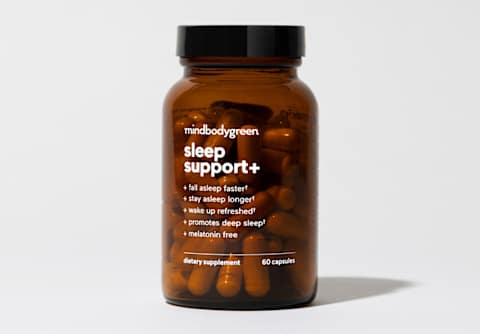Afib Raises Your Risk Of A Heart Attack (& These 2 Lifestyle Factors Could Be Contributing)
Nope, not diet-related.

Advertisement
This ad is displayed using third party content and we do not control its accessibility features.

Beauty & Health Editor
Beauty & Health Editor
Hannah Frye is the Beauty & Health Editor at mindbodygreen. She has a B.S. in journalism and a minor in women’s, gender, and queer studies from California Polytechnic State University, San Luis Obispo. Hannah has written across lifestyle sections including beauty, women’s health, mental health, sustainability, social media trends, and more. She previously worked for Almost 30, a top-rated health and wellness podcast. In her current role, Hannah reports on the latest beauty trends and innovations, women’s health research, brain health news, and plenty more.
Image by TRINETTE REED / Stocksy February 23, 2025 Atrial fibrillation (commonly referred to as Afib or AF) is a type of irregular heartbeat that generally affects older adults. This heart arrhythmia may not be inherently life-threatening, but it can raise your risk of heart attack and stroke, so it’s definitely something to keep tabs on. Common risk factors of Afib include genetic predisposition, heart attack, and heart disease, just to name a few. According to research, however, lifestyle factors may also contribute to the risk of Afib development, especially in postmenopausal women. Below, the findings. 
Stress and insomnia increase risk of Afib
A study published in the Journal of the American Heart Association found that one in four women may develop Afib after menopause and deemed a history of stressful events and insomnia as two major contributing factors.
Researchers analyzed questionnaires from over 83,000 women ages 50-79 from a major U.S. study called the Women’s Health Initiative, noticing that the risk of Afib increased by 4% for women with insomnia, and 2% for women who had reported one or more significant stressful events.
Questions related to stressful events touched on topics like illness, divorce, loss of a loved one, financial pressure, abuse, and more.
For the insomnia questionnaire, researchers inquired about trouble falling asleep and staying asleep, as well as sleep quality and duration.
What this means for women's health
This finding is important because it confirms the link between sleep, mental health, and heart health in women.
Not only does this encourage healthcare providers to consider these factors when diagnosing and treating Afib, but also reiterates the importance of getting consistent, high-quality sleep, tending to your mental health, and reaching out to a professional to help you get there should you need it.
It’s safe to say that spending just a bit more time focusing on your mental health and sleep quality will benefit your health, far beyond your heart. Below, some quick tips to manage stress and get better sleep.
7 tips to decrease stress & get better sleep
The takeaway
A study found that insomnia and stressful events can increase the risk of Afib in postmenopausal women.

 ValVades
ValVades 

































